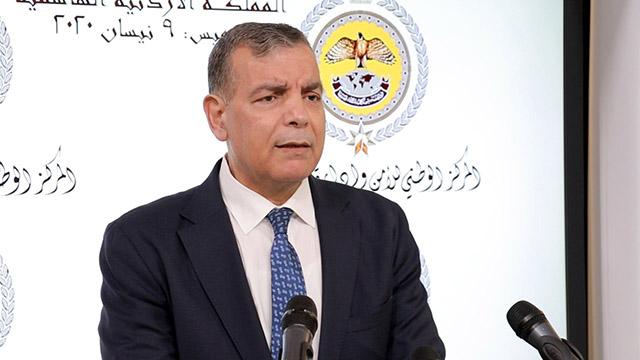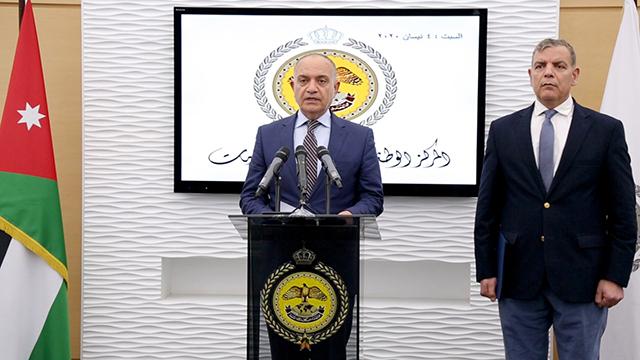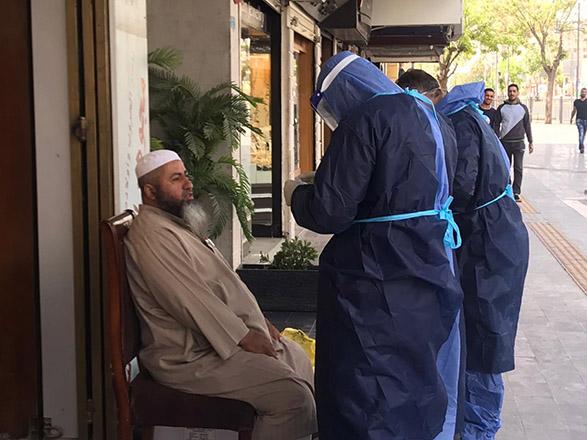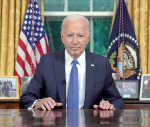You are here
New COVID-19 cases bring Kingdom’s total up to 112 as gov’t mulls extending curfew for weeks
By JT - Mar 22,2020 - Last updated at Mar 22,2020
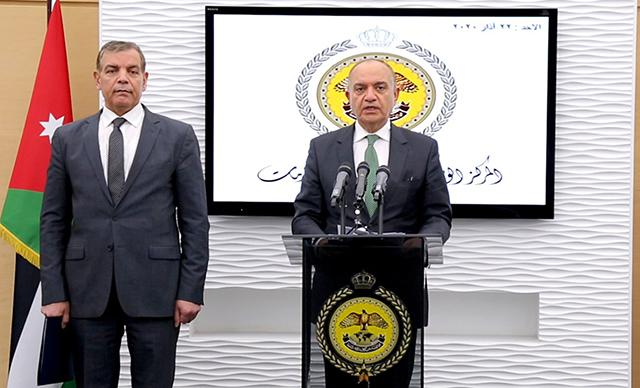
Minister of State for Media Affairs Amjad Adaileh speaks during a joint press briefing with Health Minister Saad Jaber at the National Centre for Security and Crisis Management on Sunday (Petra photo)
AMMAN — Health Minister Saad Jaber said that the number of coronavirus cases in Jordan has risen to 112 after 13 new cases were recorded on Sunday.
The minister, in a joint press briefing with Minister of State for Media Affairs Amjad Adaileh at the National Centre for Security and Crisis Management, said that the new cases include a 19-year-old who came from Britain on March 15.
He added that four of the new cases were in contact with people who had already been infected and attended a wedding in Irbid.
The new cases also include an Iraqi girl who was in contact with her infected father, who is now in isolation. Six of the new cases include people who were in contact with a nurse, including an 83-year-old woman whose condition is listed between stable and critical, in addition to a case with an unknown cause of infection that is under investigation, he said.
Jaber also noted that a Royal Jordanian plane departed to Singapore on Monday to transport 21,000 testing kits and necessary materials to enhance the Kingdom'stesting capacities.
The minister said that 34 cases were taken to the special isolation wing at Prince Hamzah Hospital in Amman, where each of its 34 rooms is equipped with all the necessary amenities.
Those under quarantine at Prince Hamzah Hospital are in “excellent” condition, he added.
Regarding an individual in Irbid whose recovery has been announced, the minister of health said that samples from the patient that were tested came back negative for COVID-19.
He added that, according to international standards, testing will be repeated after five days. If the result comes back negative again, the patient will be released and placed under home quarantine.
The health minister pointed out that His Majesty King Abdullah on Sundaydrew attention to the necessity of strengthening the psychological health of citizens under curfew, which is a “new situation for all of us”.
Jaber stressed that the incubation period for COVID-19 is 14 days, and “we must all stay at home, at least for this period”.
Also during the briefing, Adaileh noted that His Majesty King Abdullah remotely headed a meeting to follow up on the latest virus-related developments in the Kingdom.
The minister said that government work teams and the crisis unit are developing a mechanism to deliver necessities such as bread, food and medication to citizens, adding that details are to be announced later on Sunday or on Monday morning, as soon as they are agreed upon.
Adaileh said that the delivery service is the mechanism most likely to be chosen, as allowing people to leave their homes for set periods of time may result in stampedes and crowding, which would counter the government’s preventive measures.
He stressed that the coming two weeks will be decisive in limiting the spread of the virus, adding that the main responsibility falls on citizens in terms of following curfew instructions and abiding by government measures.
“Honestly, preliminary data indicates that the curfew may be extended for weeks,” Adaileh said.
“So, we stress the importance of getting used to this new lifestyle and consuming only basic needs,” he said.
The minister noted that around 700 people violated the curfew on Sunday and were detained by the Public Security Department in three designated locations in the northern, central and southern regions of the Kingdom.
He reiterated that the government will show “zero tolerance” for violation of the curfew, stressing that recklessness in this regard is “unacceptable”.
“We must learn from countries who did not impose early measures and can no longer protect their
people, or whose citizens did not abide by preventive measures, leading to the collapse of their health
systems,” the minister added.
He encouraged cancer and dialysis patients to contact the Civil Defence Department (CDD) for transportation to hospitals, adding that in other medical cases, patients who cannot go to a hospital or contact the CDD can contact volunteer medical teams who will visit them and treat them at their homes.
Related Articles
AMMAN — Jordan has recorded 14 new cases of coronavirus infection, bringing the total number of confirmed cases to 372, Health Minister Saad
AMMAN — Minister of Health Saad Jaber on Saturday announced that 13 new coronavirus cases have been recorded in Jordan, bringing the total n
AMMAN — The Kingdom on Tuesday registered no new cases of the coronavirus and six people were discharged from hospitals, leaving 89 patients


